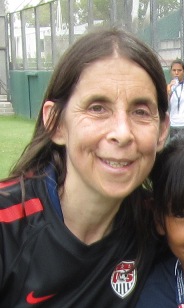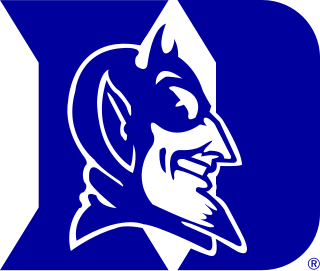Karen Christina Shelton is an American former field hockey player and coach. Shelton served as head coach of the University of North Carolina's field hockey program from 1981 until her retirement in 2022. She was a member of the U.S. National Team from 1977 to 1984 and a starter on the team that won the bronze medal at the 1984 Summer Olympics in Los Angeles, California. She attended West Chester State and was a member of four NCAA championship winning teams. Shelton also qualified for the 1980 Olympic team but did not compete due to the Olympic Committee's boycott of the 1980 Summer Olympics in Moscow, Russia. As consolation, she was one of 461 athletes to receive a Congressional Gold Medal many years later.

The North Carolina Tar Heels are the intercollegiate athletic teams that represent the University of North Carolina at Chapel Hill. The name Tar Heel is a nickname used to refer to individuals from the state of North Carolina, the Tar Heel State. The campus at Chapel Hill is referred to as the University of North Carolina for the purposes of the National Collegiate Athletic Association. Since the school fostered the oldest collegiate team in the Carolinas, the school took on the nickname Carolina, especially in athletics. The Tar Heels are also referred to as UNC or The Heels.
The 1973 NCAA lacrosse tournament was the third annual tournament hosted by the National Collegiate Athletic Association to determine the team champion of college lacrosse among its members in the United States.
The 1972 NCAA lacrosse tournament was the second annual tournament hosted by the National Collegiate Athletic Association to determine the team champion of college lacrosse among its members in the United States.
The 1986 NCAA Division I lacrosse tournament was the 16th annual tournament hosted by the National Collegiate Athletic Association to determine the team champion of men's college lacrosse among its Division I programs, held at the end of the 1986 NCAA Division I men's lacrosse season.

The 2009 NCAA Division I lacrosse tournament was the 39th annual tournament hosted by the National Collegiate Athletic Association to determine the team champion of men's college lacrosse among its Division I programs, held at the end of the 2009 NCAA Division I men's lacrosse season. The tournament was played from May 9–25, 2009.
The 1985 NCAA Division I lacrosse tournament was the 15th annual tournament hosted by the National Collegiate Athletic Association to determine the team champion of men's college lacrosse among its Division I programs, held at the end of the 1985 NCAA Division I men's lacrosse season.
The 1982 NCAA Division I lacrosse tournament was the 12th annual tournament hosted by the National Collegiate Athletic Association to determine the team champion of men's college lacrosse among its Division I programs at the end of the 1982 NCAA Division I men's lacrosse season.

The 2009–10 North Carolina Tar Heels men's basketball team represented the University of North Carolina at Chapel Hill. Their head coach was Roy Williams. The team played its home games in the Dean Smith Center in Chapel Hill, North Carolina, and is a member of the Atlantic Coast Conference. They were the defending National Champions. This season represented the 100th season of basketball in the school's history.

The North Carolina Tar Heels men's lacrosse team represents the University of North Carolina at Chapel Hill in National Collegiate Athletic Association (NCAA) Division I men's lacrosse. North Carolina currently competes as a member of the Atlantic Coast Conference (ACC) and plays its home games at Fetzer Field and Kenan Memorial Stadium in Chapel Hill, North Carolina. Their main rivalry series is with fellow ACC member Duke.
Donald Zimmerman is a television analyst and former American college lacrosse coach. He became a color analyst for ESPN in May 2016 and does both high school and college lacrosse games. Prior to becoming an analyst, he served as the head coach for the UMBC Retrievers at the University of Maryland, Baltimore County for 24 years. Between 1984 and 1987, Zimmerman coached Johns Hopkins to three national championships. Zimmerman was inducted into the National Lacrosse Hall of Fame in 2017.
The Virginia Cavaliers men's lacrosse team represents the University of Virginia in National Collegiate Athletic Association (NCAA) Division I men's lacrosse. The Cavaliers compete in the Atlantic Coast Conference (ACC) and plays home games at Klöckner Stadium, or occasionally Turf Field or Scott Stadium, in Charlottesville, Virginia. The team is coached by Lars Tiffany, who led the team to back-to-back national titles in the 2019 NCAA Lacrosse Championship and 2021 NCAA Lacrosse Championship.
Robert H. Scott was a Hall of Fame lacrosse coach for the Johns Hopkins Blue Jays men's lacrosse team, serving from 1955 until 1974. He compiled a career record of 158 wins and 55 losses to go along with seven National Championships. He won the F. Morris Touchstone Award in being named the USILA National Coach of the Year in 1965, 1968 and 1972.
The NCAA Division I Men's Lacrosse Championship tournament determines the annual top men's college lacrosse team in the NCAA Division I. This tournament has determined the national champion since the inaugural 1971 NCAA Division I Men's Lacrosse Championship. From 1936 through 1970, the United States Intercollegiate Lacrosse Association (USILA) awarded the Wingate Memorial Trophy annually to the collegiate champion based on regular season records.

The North Carolina Tar Heels men's soccer team represents the University of North Carolina at Chapel Hill in men's NCAA Division I soccer competition. They compete in the Atlantic Coast Conference. The Tar Heels won the NCAA championship in 2001 and 2011.

The North Carolina Tar Heels women's lacrosse team represents the University of North Carolina at Chapel Hill in National Collegiate Athletic Association (NCAA) Division I women's lacrosse and currently competes as a member of the Atlantic Coast Conference (ACC). The North Carolina women's lacrosse team won the ACC tournament in 2002 and their first Division 1 national championship in 2013.

The Drexel Dragons men's lacrosse team represents Drexel University in National Collegiate Athletic Association (NCAA) Division I men's lacrosse. Drexel currently competes as a member of the Colonial Athletic Association (CAA) and plays its home games at Vidas Field in Philadelphia, Pennsylvania. Drexel made its first NCAA tournament appearance in 2014, and a second NCAA tournament appearance in 2021.
The 2014 ACC women's and men's lacrosse conferences will include Notre Dame and Syracuse after those teams joined the ACC in July 2013. The 2014 ACC women's lacrosse conference will now include eight teams. This will be the only year that the ACC women's lacrosse conference will include these eight teams as Maryland will leave the ACC for the Big Ten at the end of the 2014 season. Boston College plays in the women's ACC conference, but not the men's conference.

Lauren Gregg is an American soccer coach and retired soccer player who played as a defender or midfielder. She made one appearance for the United States women's national soccer team in 1986. She was the first-ever female assistant coach for any of the United States' national teams between 1987 and 2000, and was interim head coach of the United States women's national soccer team in 1997 and 2000. As head coach of the women's soccer team at the University of Virginia from 1986 to 1995, Gregg was the first woman to lead a team to the NCAA Division I Final Four and to be named NSCAA Coach of the Year.

The Duke–North Carolina lacrosse rivalry is an intercollegiate lacrosse rivalry between the Duke Blue Devils and the North Carolina Tar Heels. Located just 9.8 miles apart on Tobacco Road, the two programs are classic rivals in the Atlantic Coast Conference, headlined by their basketball and football rivalries, but also extending to lacrosse - even club lacrosse. The rivalry has carried national importance itself since the 1990s, leading to numerous thrilling contests between the two in the ACC and NCAA postseason tournaments. Duke leads the ACC series 9–4 and has compiled a perfect 4–0 mark against the heels in NCAA tournament play. Current Heels coach Joe Breschi summed up the rivalry as "when you’re 12 miles away from a school that you don’t like and doesn’t like you, it makes it more intense. There’s so much more meaning there than any other game. That’s what makes winning that much more sweet." In 2019, his counterpart Duke head coach John Danowski described the annual challenge of facing UNC: "They're really good. They're very well-coached, they get the best players in the country year after year, they have the top recruiting classes, and they hate Duke." As a testament to the national success between the two schools, the Blue Devils have won three national titles, while the Tar Heels lay claim to five. As of the end of the 2023 season, North Carolina leads the series 43–37.




